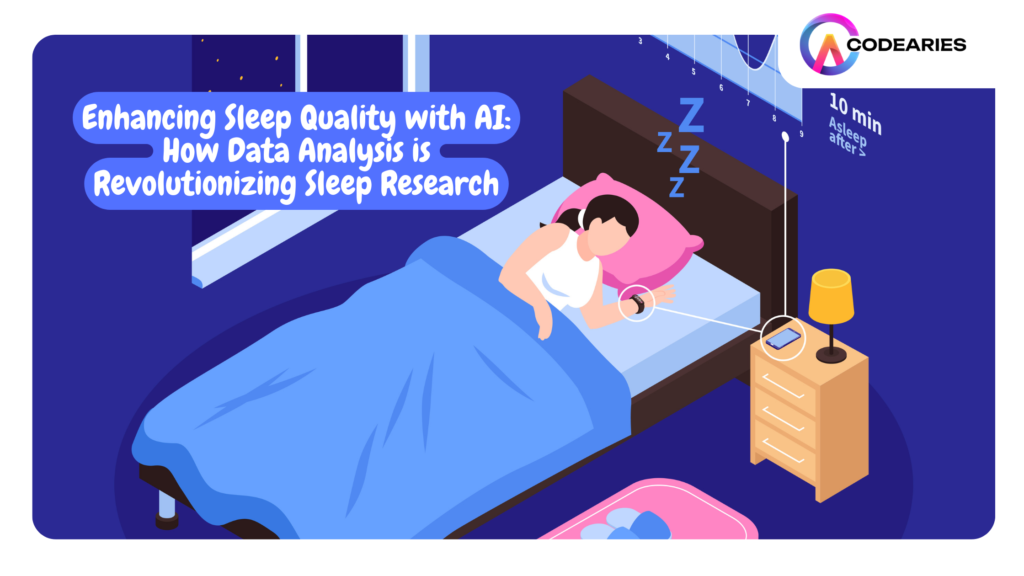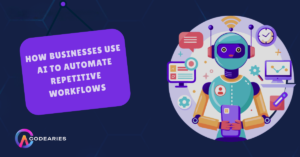Enhancing Sleep Quality with AI How Data Analysis is Revolutionizing Sleep Research (1)

Introduction
Sleep is a fundamental aspect of human health, impacting everything from cognitive function to physical well-being. Despite its importance, many people struggle with sleep-related issues, such as insomnia, sleep apnea, and restless leg syndrome. Traditional methods of studying and treating sleep disorders often involve subjective assessments and can be time-consuming and costly. However, recent advancements in artificial intelligence (AI) and machine learning (ML) are revolutionizing sleep research, offering new insights and solutions to enhance sleep quality.
Understanding Sleep and Its Importance
The Science of Sleep
Sleep is a complex biological process that involves several stages, each playing a crucial role in maintaining health. These stages include:
- NREM Stage 1 (N1): Light sleep, where one drifts in and out of sleep.
- NREM Stage 2 (N2): Deeper sleep, characterized by a decrease in body temperature and heart rate.
- NREM Stage 3 (N3): Deep sleep, also known as slow-wave sleep, essential for physical restoration and growth.
- REM Sleep: Rapid eye movement sleep, where dreaming occurs, important for cognitive functions like memory consolidation and mood regulation.
Importance of Sleep Quality
Good sleep quality is essential for overall health. It affects cognitive functions, emotional regulation, physical health, and the immune system. Poor sleep quality or sleep disorders can lead to various health problems, including:
- Cognitive impairments (memory issues, reduced concentration)
- Emotional instability (anxiety, depression)
- Physical health issues (hypertension, cardiovascular diseases)
- Decreased immune function
The Role of AI in Sleep Research
AI and machine learning are transforming the field of sleep research by providing tools to analyze vast amounts of data, identify patterns, and develop personalized treatment plans. Here’s how AI is being used to study sleep patterns and disorders:
Data Collection and Analysis
Traditional sleep studies often involve polysomnography (PSG), which requires patients to spend the night in a sleep lab hooked up to various monitoring devices. While effective, this method is intrusive and not always representative of a person’s typical sleep environment. AI offers an alternative by enabling continuous, non-invasive monitoring through wearable devices and smart home technology.
Techniques and Applications:
- Wearable Devices: AI-powered wearables (e.g., Fitbit, Oura Ring) track sleep patterns, heart rate, and movement. These devices collect data over extended periods, providing a comprehensive view of sleep habits.
- Smart Home Technology: AI systems integrated into smart home devices (e.g., smart mattresses, bedroom sensors) monitor environmental factors like temperature, light, and noise that affect sleep quality.
- Mobile Apps: AI-driven sleep tracking apps analyze sleep patterns using smartphone sensors and provide insights and recommendations.
Case Study:
The use of AI in the Oura Ring, a wearable device, demonstrates how continuous data collection can enhance sleep research. The Oura Ring tracks various physiological signals, including heart rate variability, body temperature, and movement, to provide detailed insights into sleep stages and overall sleep quality.
Sleep Pattern Recognition
AI algorithms can analyze the data collected from wearable devices and other sources to recognize sleep patterns and identify abnormalities. Machine learning models can be trained to detect specific sleep stages and disorders with high accuracy.
Techniques and Applications:
- Machine Learning Models: Supervised learning models, such as support vector machines (SVM) and neural networks, classify sleep stages based on physiological data.
- Deep Learning: Convolutional neural networks (CNNs) and recurrent neural networks (RNNs) are used for more complex pattern recognition, including the detection of sleep disorders like sleep apnea.
- Time Series Analysis: AI algorithms analyze time series data from wearable devices to identify patterns and trends in sleep behavior.
Case Study:
A study conducted by the University of California, San Francisco, utilized deep learning algorithms to analyze PSG data. The AI model accurately identified different sleep stages and detected sleep apnea events, demonstrating the potential of AI in diagnosing sleep disorders.
Personalized Sleep Solutions
One of the significant advantages of AI in sleep research is the ability to develop personalized sleep solutions. By analyzing individual sleep patterns and environmental factors, AI can provide tailored recommendations to improve sleep quality.
Techniques and Applications:
- Personalized Recommendations: AI-driven apps and devices offer personalized sleep tips based on individual data, such as adjusting bedtime routines, optimizing sleep environments, and suggesting relaxation techniques.
- Adaptive Sleep Therapies: AI systems can adapt cognitive-behavioral therapy for insomnia (CBT-I) based on real-time feedback, providing more effective treatment plans.
- Biofeedback: AI-powered biofeedback devices monitor physiological signals and provide real-time feedback to help individuals achieve better sleep.
Case Study:
The Sleepio app, developed by Big Health, uses AI to provide personalized CBT-I programs. The app tailors its recommendations based on user data, offering specific strategies to address individual sleep issues and improve sleep quality over time.
Benefits of AI in Sleep Research
The integration of AI in sleep research offers numerous benefits, making the study and treatment of sleep disorders more efficient, accurate, and accessible. Here are some of the key advantages:
- Non-Invasive Monitoring: AI-powered wearable devices and smart home technology enable continuous, non-invasive monitoring of sleep patterns, providing a more accurate representation of typical sleep behavior.
- Enhanced Accuracy: Machine learning algorithms can analyze large datasets with high accuracy, identifying subtle patterns and abnormalities that might be missed by traditional methods.
- Personalization: AI can develop personalized sleep solutions tailored to individual needs, improving the effectiveness of treatments and recommendations.
- Cost-Effectiveness: AI-driven solutions can reduce the cost of sleep studies and treatments by automating data collection and analysis, making sleep care more accessible.
- Proactive Health Management: Continuous monitoring and analysis allow for early detection of sleep disorders, enabling proactive management and prevention of related health issues.
Future Prospects and Challenges
The future of AI in sleep research holds immense potential, but it also presents several challenges. Addressing these challenges is crucial for the successful integration of AI into the field.
Future Prospects
- Advanced Sleep Disorder Diagnostics: AI has the potential to revolutionize the diagnosis of sleep disorders, offering more accurate and timely identification of conditions like sleep apnea, insomnia, and restless leg syndrome.
- Integration with Other Health Data: Combining sleep data with other health metrics (e.g., diet, exercise, stress levels) can provide a holistic view of health and enhance personalized treatment plans.
- Real-Time Interventions: AI-powered systems can provide real-time interventions to improve sleep quality, such as adjusting environmental factors or offering relaxation techniques during the night.
- Remote Sleep Clinics: AI can enable the development of remote sleep clinics, providing accessible and affordable sleep care to individuals in underserved areas.
Challenges
- Data Privacy and Security: Ensuring the privacy and security of sensitive sleep data is crucial. Robust measures must be in place to protect user data from breaches and misuse.
- Accuracy and Reliability: AI models must be trained on diverse datasets to ensure accuracy and reliability across different populations and sleep conditions.
- Human Acceptance: Gaining the trust and acceptance of individuals, healthcare providers, and regulatory bodies is essential for the widespread adoption of AI in sleep research.
- Ethical Considerations: Ethical issues related to the use of AI in healthcare, such as informed consent and transparency, must be addressed to ensure responsible use.
CodeAries: How we can help in AI-Driven Sleep Research
CodeAries, a leading provider of IT software development services, is uniquely positioned to develop advanced platforms that leverage AI for sleep research. By combining expertise in machine learning, data analysis, and health technology, CodeAries can create innovative solutions that address the needs of individuals and healthcare providers.
Potential Solutions by CodeAries
- AI-Powered Sleep Monitoring Platforms: CodeAries can develop platforms that integrate data from wearable devices, smart home technology, and mobile apps to provide comprehensive sleep monitoring and analysis.
- Personalized Sleep Improvement Programs: CodeAries can create AI-driven programs that offer personalized recommendations and interventions based on individual sleep data, enhancing sleep quality and addressing specific issues.
- Advanced Sleep Disorder Diagnostics: CodeAries can develop machine learning models to diagnose sleep disorders with high accuracy, providing timely and effective treatment plans.
Remote Sleep Clinics: CodeAries can establish remote sleep clinics that leverage AI to provide accessible and affordable sleep care, particularly in underserved areas.
Conclusion
AI and machine learning are revolutionizing sleep research, offering new insights and solutions to enhance sleep quality and address sleep disorders. By providing non-invasive monitoring, accurate analysis, and personalized recommendations, AI is making sleep care more efficient, effective, and accessible. As we look to the future, the integration of AI into sleep research promises to transform the field, improving the health and well-being of individuals worldwide.







